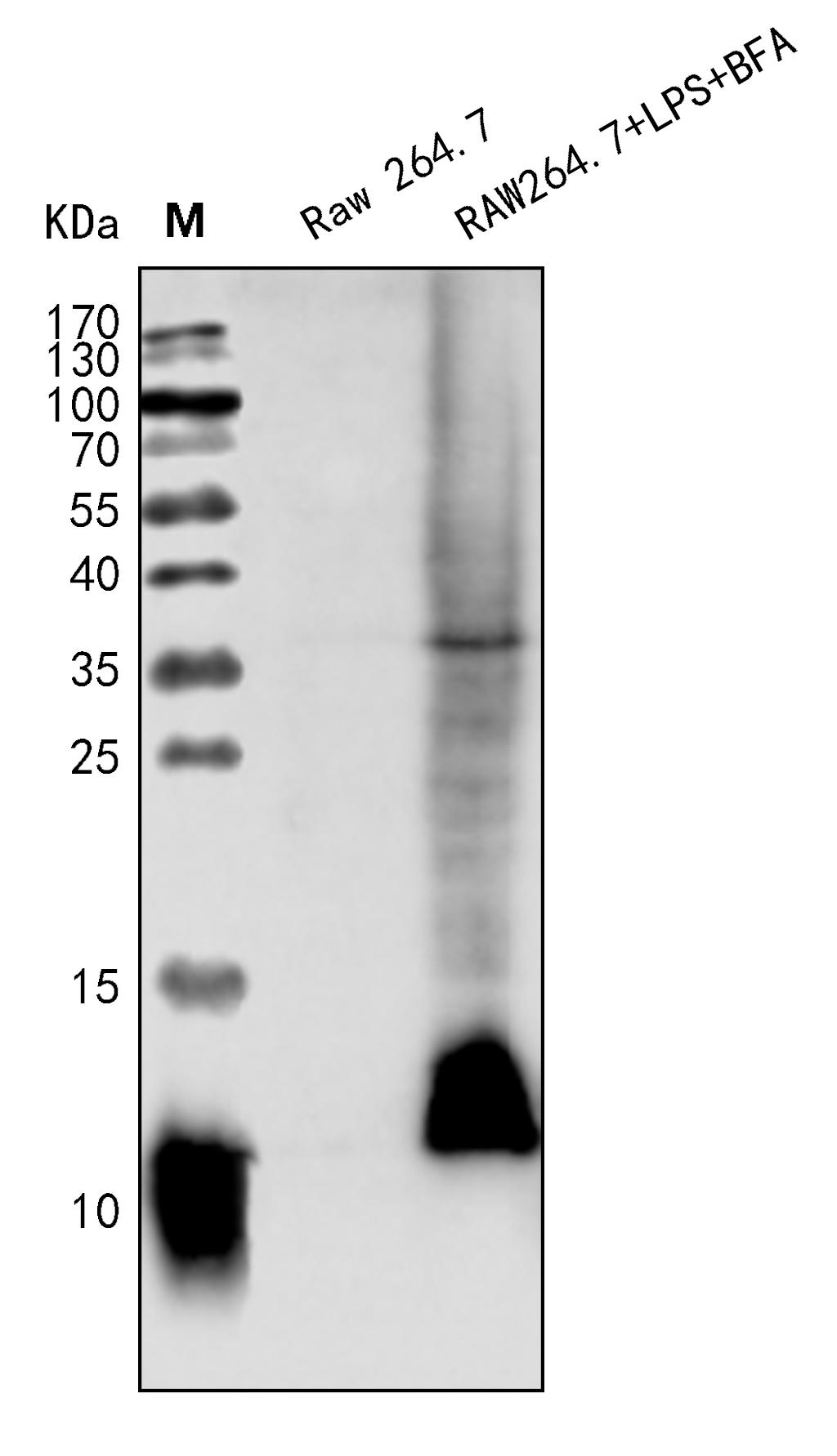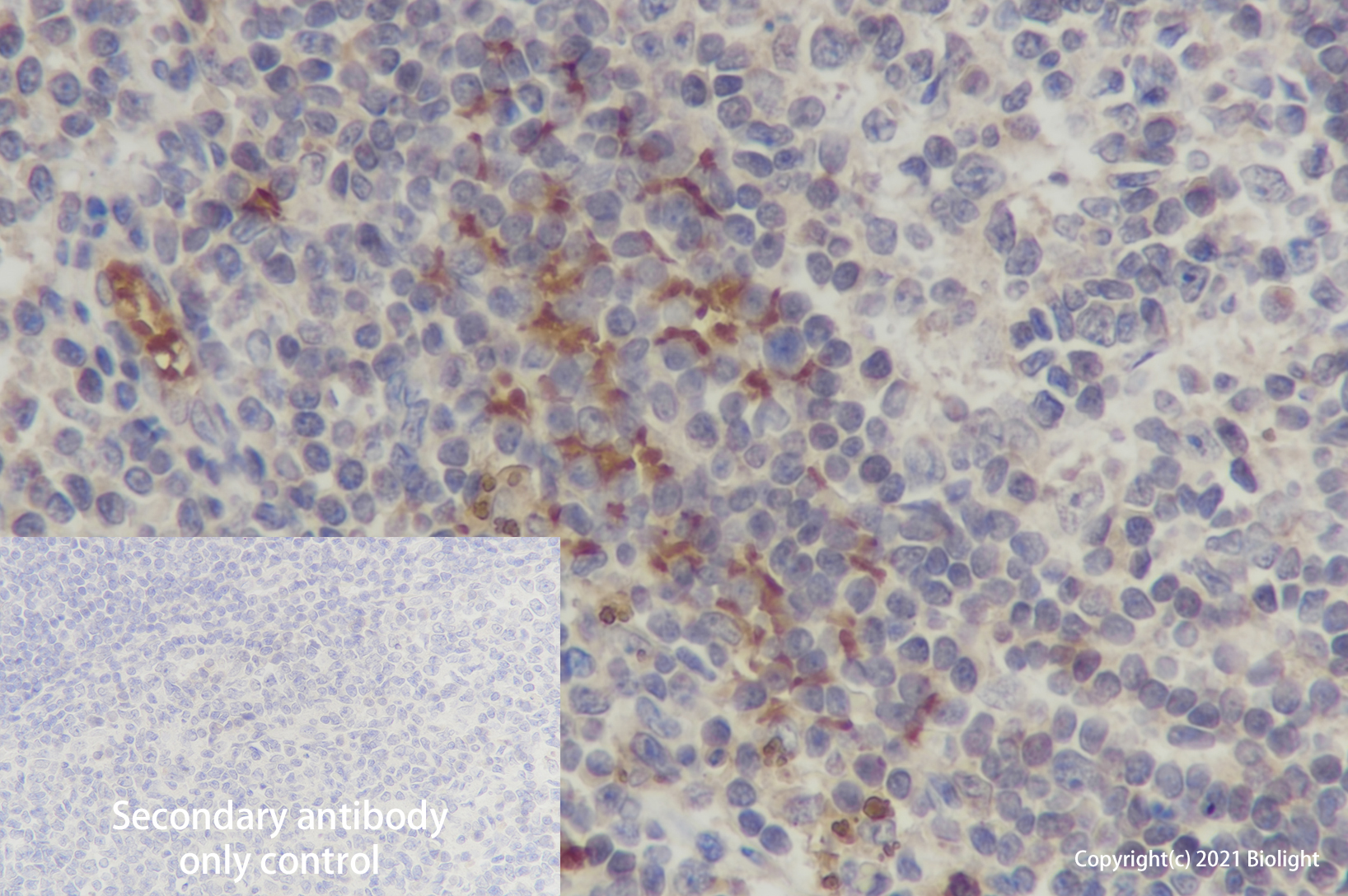
产品名称:Anti-CCL3 Antibody, Mouse Monoclonal
经验证的应用:WB
交叉反应:/
特异性:mouse CCL3
免疫原:Recombinant mouse CCL3 protein, fragment Ala24~Ala92; UniprotKB: Q5QNW0
制备方法:Produced in rabbits immunized with mouse CCL3, and purified by antigen affinity chromatography
来源:Polyclonal Rabbit IgG
纯化:Immunogen affinity purified
缓冲液:Supplied in PBS, 50% glycerol and less than 0.02% sodium azide, PH7.4
偶联物:Unconjugated
状态:Liquid
运输方式:This antibody is shipped as liquid solution at ambient temperature. Upon receipt, store it immediately at the temperature recommended.
储存条件:This antibody can be stored at 2℃-8℃ for one month without detectable loss of activity. Antibody products are stable for twelve months from date of receipt when stored at -20℃ to -80℃. Preservative-Free. Avoid repeated freeze-thaw cycles.
图片:
Figure1.Immunohistochemistry (Formalin/PFA-fixed paraffin-embedded sections) analysis of human tonsil sections labelling CCL3 with purified PA00577MuA10 at 10ug/ml. Heat mediated antigen retrieval was performed using EDTA buffer (pH 9.0) . Tissue was counterstained with Hematoxylin. Rabbit specific IHC polymer detection kit HRP/DAB secondary antibody was used at 1/4000 dilution. PBS instead of the primary antibody was used as the negative control.
别称:CCL3, MIP1-A, SCYA3, Chemokine C-C-Motif Ligand 3, Small Inducible Cytokine A3, Homologous To Mouse Mip-1a, Tonsillar Lymphocyte LD78 Alpha Protein
背景信息:CCL3/MIP-1 alpha. CCL3, also known as macrophage inflammatory protein 1 alpha (MIP-1 alpha ) and LD78, is a member of the beta or CC subfamily of chemokines and is closely related to CCL4/MIP-1 beta. Chemokines comprise a large family of small secreted proteins that are involved in immune and inflammatory responses. CCL3 expression can be induced in a variety of hematopoietic cells, fibroblasts, smooth muscle cells, and epithelial cells (1). Mature human CCL3 shares 70% - 74% amino acid sequence identity with mouse, rat, and cotton rat CCL3 (2). CCL3 is an approximately 8 kDa chemokine that forms complexes with sulfated proteoglycans (3, 4). In a reversible process, CCL3 associates into noncovalently-linked dimers which then form tetramers and high molecular weight polymers (5, 6). These complexes of CCL3 are protected from proteolytic digestion by insulin degrading enzyme (IDE) which can cleave the monomeric chemokine (6). CCL3 exerts its biological functions through interactions with CCR1, CCR3, and CCR5 (1). It is cleared from the extracellular space by internalization via the decoy chemokine receptor D6 (7). CCL3 promotes the chemoattraction, adhesion to activated vascular endothelium, and cellular activation of many hematopoietic cell types including activated T cells, NK cells, neutrophils, monocytes, immature dendritic cells, and eosinophils (1, 8 - 10). CCL3 is also known as stem cell inhibitor (SCI) and can inhibit the proliferation of hematopoietic progenitor cells (3). CCL3 bioactivity contributes to tumor metastasis and the inflammatory components of viral infection, rheumatoid arthritis, and hepatitis (11 - 14), although it also can suppress the replication of HIV (15). CCL3 additionally promotes hyperalgesia by sensitizing sensory neurons to TRPV1-mediated noxious stimulation (16)
全称:C-C motif chemokine 3 (CCL3)



